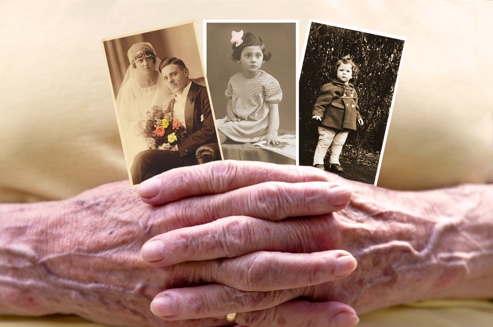For seniors, life review and reminiscence are key components of aging and ending life well as they look back to determine whether they’ve led happy, successful lives. Typically, these memories are composed by prompts such as pictures, personal items, or recordings. The main goal of this process for an individual to experience reflection on cherished memories. Reminiscence therapy will give life more value as it connects families to their loved one’s past and is a wonderful tool to engage a person who is aging or suffering from memory loss.
Therapeutic approaches like reminiscence therapy is sometimes confused with life review therapy. While they are often used interchangeably, there are some small differences. For example, reminiscence therapy is often about describing a memory itself. Life review therapy is based on discussing what a memory means to the individual. Both can help people deal with difficult memories or unresolved concerns and achieve a sense of peace or empowerment about their lives.
Life review and reminiscence processes can help older adults complete the important developmental task of contemplating on one’s life, enabling them to reframe and resolve past events and relationships that may be contributing to depression and despair in the present. They can also help with feelings about end-of-life and help illuminate the greater meaning in life. Finally, these activities can promote improved self-esteem. People may not realize the significance of their accomplishments — from raising children to being the first person in their family to earn a college degree - looking back can help people feel proud of what they have accomplished. Think about breaking out the old photo albums or family videos and using them to open up conversations with your loved one.
There are also benefits for families when their loved one participates in life review. The family may learn things they never knew before. They can gain access to their older loved one’s stories, words of wisdom and lessons of life. People have always learned and come to understand life through story telling. Storytellers in traditional societies were older adults, the ones who remembered the past and helped the young learn from it. In our hectic modern world, this storytelling role among older citizens fell by the wayside and with it our connection to the past and our family history.
But now, new tools brought to us as part of the modern digital age can restore the great art of intergenerational story telling. The internet provides fantastic opportunities for preserving memories and making sure that they are easily accessible even years into the future. There are now easy to use websites and apps that allow people to create a digital legacy for their life. These sites offer the opportunity to upload stories, photos, and videos. They give users a platform to creatively document, organize and present the story of their life. So, that for generations to come a part of each of us can live on, albeit digitally.
SafeBeyond is one such service. It is the leading online legacy-building, life review and reminiscence platform. It’s an easy way for people to share their words of wisdom, tell their story and control how they want to be remembered by capturing and securely storing their meaningful moments, fond memories and important information for future sharing, even after they're gone. Users can create messages in video, audio or text format and choose from among event, time or even location-based release triggers. SafeBeyond enables people to stay part of their loved ones’ lives years into the future even after they’re gone.
Reminiscence therapy provides family members and caregivers with a fantastic tool to enrich their relationship and interaction with older loved ones by enabling a meaningful, creative process together, with the added value of a tangible output of personalized future messages to other family members including children, grandchildren and great grandchildren. Recipients will find comfort and have their burden eased by ongoing loving communication and easy access to important documents from deceased loved ones when they are needed most.



